© 2024 ALLCITY Network Inc.
All rights reserved.

How do you determine the greatest athletes in the history of a state? It’s a tall task; one that inevitably will spark discussion and debate.
While there are no perfect answers, PHNX assembled an all-star panel of current and former Arizona media members from across the state and platforms. We asked each panel member to consider only college and professional athletes who had competed for Arizona teams at the pro or college level. Each of the 15 panelists provided their own top-25 list, points were awarded for each vote on the list (25 points for a No. 1 vote, 24 for a No. 2 vote and so on). Scores for each athlete were tabulated to arrive at the Top 25 Athletes in Arizona history.
Consider this list an open discussion. You can voice your own opinions in our Discord channels, the comment section of this story or on social media. Tell us what we got it right, where you think we got it wrong and any deserving athletes whom you feel we omitted from our list.
The list will be revealed, five athletes at a time, throughout the week of Aug. 28.
Without further ado, here is the PHNX Ranks: Top 25 Arizona Athletes of All-Time
No. 25: Keith Tkachuk – Phoenix Coyotes
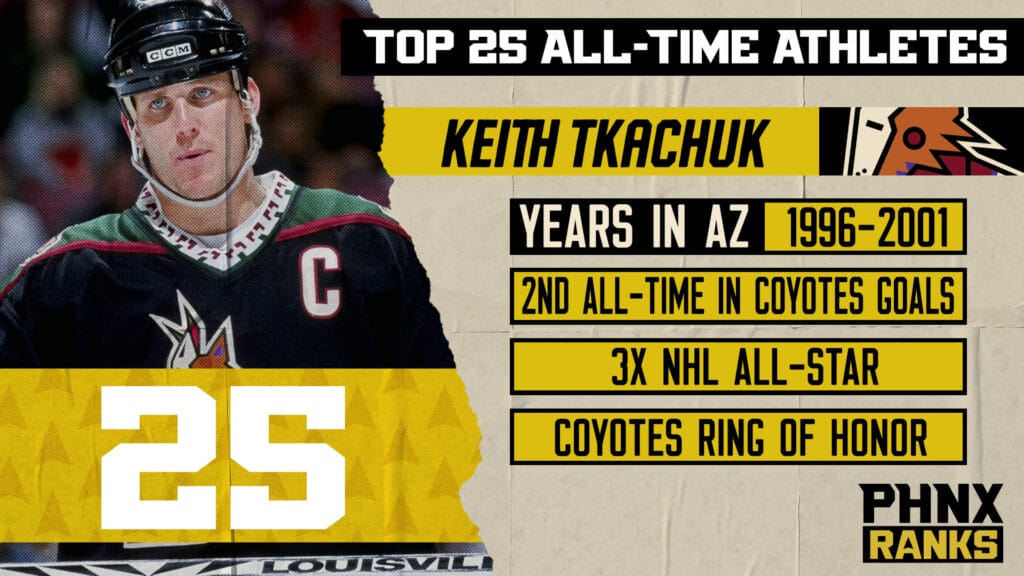
In terms of on-ice achievements, he is still the greatest player in Coyotes history. He has the most goals (52, 1996-97) in a single season in Arizona franchise history, he is the only Coyotes player to eclipse 40 goals (twice), he is tied with Clayton Keller for the most points in a single-season in Arizona franchise history (86) and he is the Coyotes’ all-time leader in points per game with 334 in 332 games (1.006). While Tkachuk was not the flamboyant fan favorite that Jeremy Roenick was, he was every bit as instrumental in selling the game to a new fan base when the Coyotes arrived in 1996. He was tireless in his charity work, he set the tone for future leaders to take care of lesser-known staff members and he was the unquestioned captain; a fiery leader. As for those points, he got most of them from the hard areas around the net where he took a beating. Had Blues defenseman Jamie Rivers not swept Tkachuk’s would-have-been OT/series winner off the goal line in Game 7 of their 1999 playoff series at America West Arena, Tkachuk could have led the Coyotes on their first playoff run, too.
No. 24: Reggie Jackson – Arizona State Sun Devils
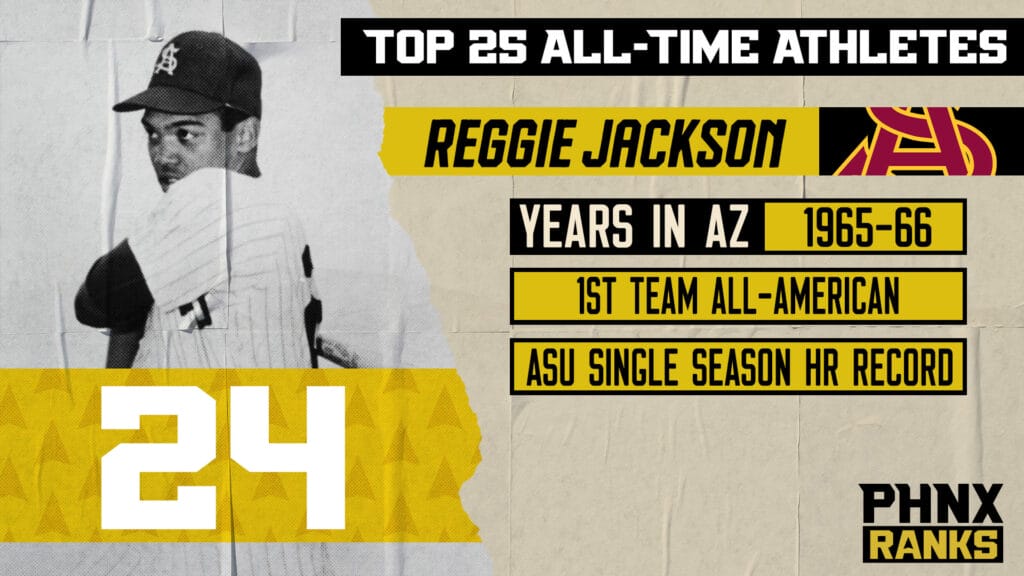
This is a controversial pick. Jackson spent just one season at ASU and originally reported on a football scholarship. After walking on to coach Bobby Winkles’ squad in 1966, Jackson helped lead ASU to a 41-11 record with 15 home runs while leading the team in runs, total bases, hits and RBI. He was named a First Team All-American. The Sun Devils finished second in the Western Athletic Conference that season, however, and did not make it to the College World Series, an event that they won the year before Jackson arrived and the year after he left as the second overall pick of the then-Kansas City Athletics.
No. 23: Danny White – Arizona State Sun Devils

White was a second generation Sun Devil, following his father and ASU football legend Wilford “Whizzer” White. A Mesa Westwood High School product, Danny White took over as ASU’s starter in 1971, throwing for 1,643 yards and 17 touchdowns. He helped lead the No. 8 Sun Devils (11-1) to a 45-28 win over Florida State in the inaugural Fiesta Bowl in 1971. He followed that up by breaking John Torok’s ASU single-season touchdown pass record with 23 TDS in his sophomore season, and another Fiesta Bowl win (49-35 over Missouri). In 1973, his last in Tempe, he broke Torok’s passing yardage record by throwing for 2,878 yards, and broke his own single-season passing touchdown record with 24 TDs. He led the 11-1 Sun Devils to yet another Fiesta Bowl win, this time a 28-7 over Pittsburgh. That season, White was named a second-team All-American. Upon his graduation, he was the school’s all-time leader in passing yards and touchdowns, and his 32-4 record as a starter is still a school best.
No. 22: James Harden – Arizona State Sun Devils
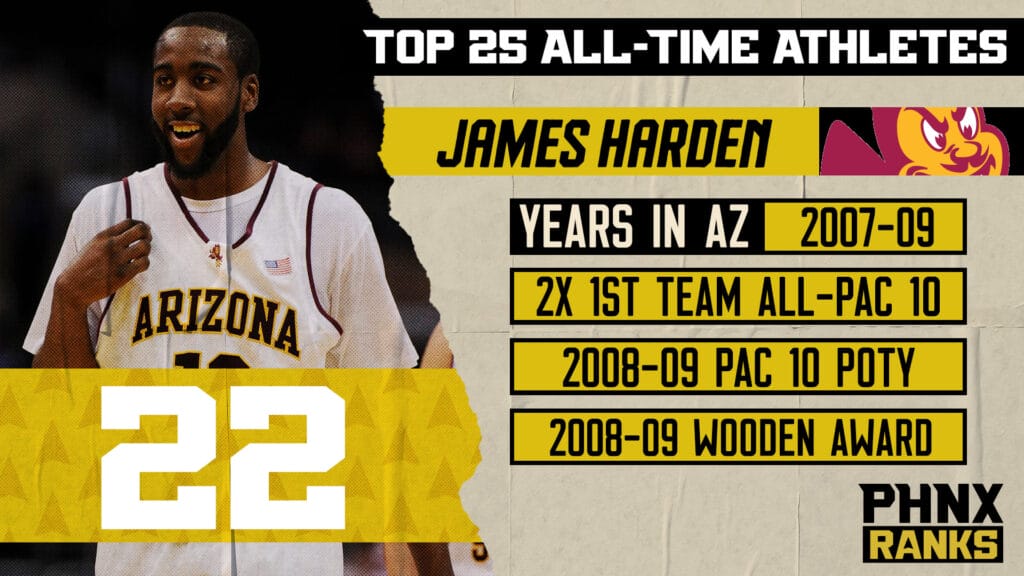
This will offend University of Arizona fans, but the greatest basketball player ever to grace Arizona’s universities played at ASU. Harden was the crown jewel of Herb Sendek’s recruiting efforts, a five-star prospect with a boatload of schools after him including Washington, USC and UCLA. In his two years with the Sun Devils, the eventual 2018 NBA MVP was a two-time, first-team all-conference selection. In his sophomore season of 2008-09, Harden helped the Sun Devils advance to the second round of the NCAA Tournament for the only time in the past 20 seasons. That same season, he was named Pac-10 Player of the Year and a consensus All-American. In two seasons at ASU, he averaged 19 points per game, 5.4 rebounds, 3.7 assists, 1.9 steals and 35 minutes.
No. 21: Annika Sörenstam – Arizona Wildcats
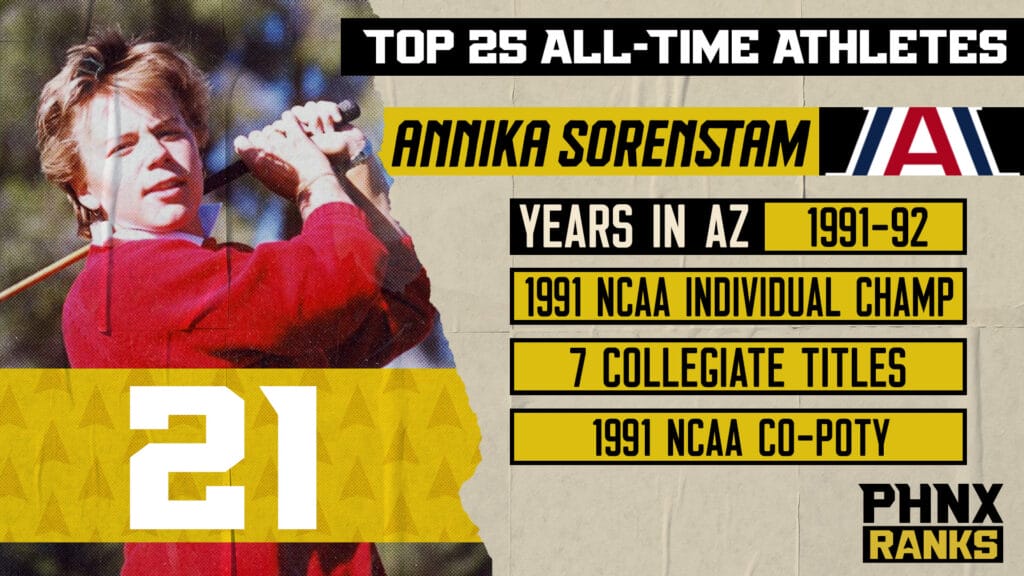
Before she was winning an LPGA-record 90 tournaments, a modern-era record 10 LPGA major titles (including a career grand slam) and a record eight LPGA Player of the Year awards, Sörenstam was a standout at the University of Arizona. Sörenstam won seven collegiate tournaments in 1991, including becoming the first non-American and first freshman to win the individual NCAA Division I Championship. She was named the 1991 NCAA Co-Player of the Year with Kelly Robbins. She followed that up with a runner-up finish at the 1992 NCAA championship before turning pro. Sörenstam was a two-time All-American for the Wildcats and is arguably the greatest women’s pro golfer in history.
No. 20: Curt Schilling – Arizona Diamondbacks
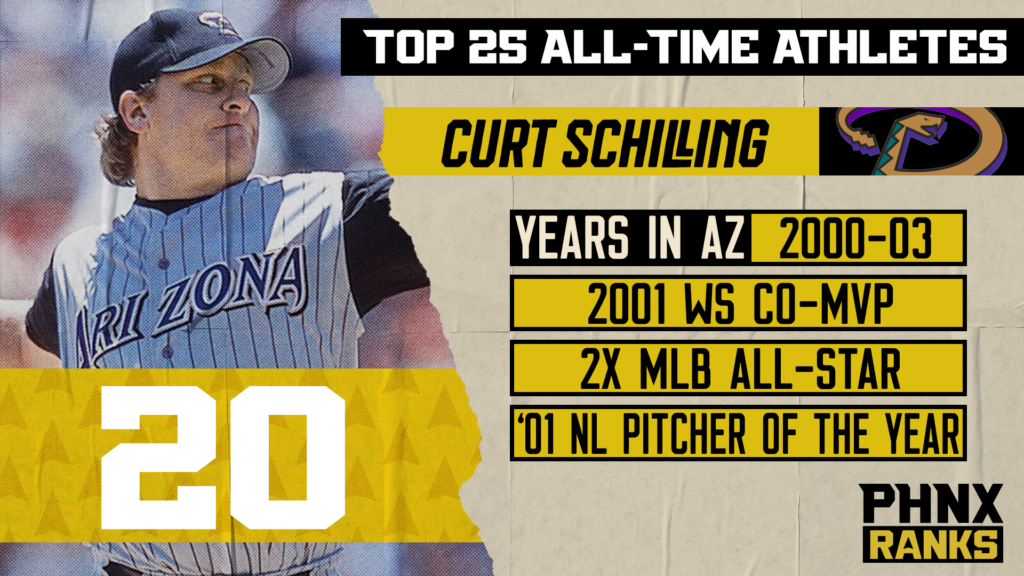
Schilling came to the Diamondbacks via trade with the Phillies midway through the 2000 season. While he only pitched in Phoenix for 3½ seasons, he had a central role in the best era of D-backs baseball. In Arizona, Schilling had 3.14 ERA and a 1.07 WHIP in 781.2 innings with 25.3 WAR. He made two NL All-Star teams while giving the Diamondbacks the most lethal 1-2 combo in baseball, alongside Randy Johnson. In the 2001 World Series, Schilling was named the co-MVP (with Johnson) after allowing four earned runs in 21.1 innings (1.69 ERA) with 26 strikeouts. The Diamondbacks beat the Yankees in an emotion-packed series after the Sept. 11 terrorist attacks, giving Arizona its only major pro men’s sports title.
No. 19: Terrell Suggs – Arizona State Sun Devils
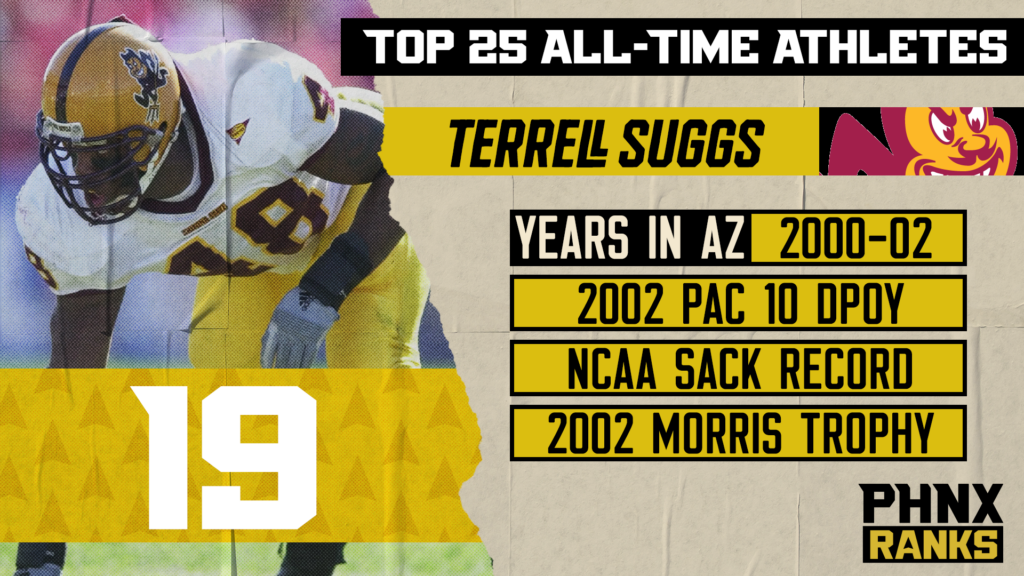
Before he was terrorizing Pac-10 quarterbacks, T-Sizzle helped turn Chandler Hamilton High School into a national power while earning Gatorade Arizona Player of the Year honors. Once he arrived at ASU, however, he became a dominant force along the defensive line. He finished his career with 163 tackles, including a school-record 65.5 tackles for loss, 44 sacks, 14 forced fumbles, three fumble recoveries, two interceptions, and nine passes deflected. He set an NCAA single-season record with 24 sacks in 2002. Following that junior season, he was named the Pac-10 Defensive Player of the Year, he won the Bronko Nagurski Award, the Ted Hendricks Award, the Vince Lombardi Award, and he was recognized as a unanimous first-team All-American. After ASU’s 34-20 Territorial Cup win at Arizona Stadium in which Suggs had two sacks, then-coach Dirk Koetter grabbed his star junior by the shoulders while reporters interviewed Suggs. “One more year!” Koetter pleaded. “One more year!” It was not to be. Suggs turned pro and the Ravens selected him with the No. 10 overall pick.
No. 18: Randall McDaniel – Arizona State Sun Devils

A four-year starter on ASU’s offensive line after converting from tight end, Randall McDaniel was a two-time First Team All-American. He led the Sun Devils to three bowl berths during his career, including 1986, when Arizona State went 10-1-1 and beat Michigan in the Rose Bowl. In 1987, he won the Morris Trophy as the best lineman in the Pac-10. He was inducted into the College Football Hall of Fame in 2008. McDaniel may also be the greatest athlete in Avondale Agua Fria High School history, having starred in football, basketball and track. When finally left Arizona for the NFL, he was the starting left guard on 12 straight Pro Bowl teams.
No. 17: Paul Goldschmidt – Arizona Diamondbacks
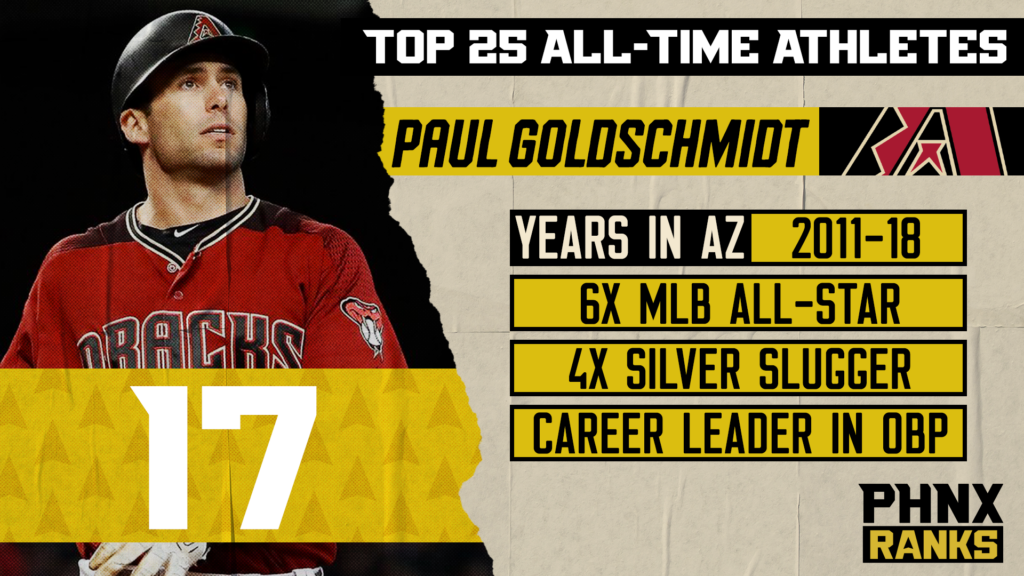
The Diamondbacks played in just two postseasons in Goldy’s eight seasons in Arizona, and they never advanced past the NLDS, but during that time, Goldschmidt was one of the game’s best players. He was a six-time All-Star, he finished among the top six in MVP voting four times, and he won the Gold Glove Award and Silver Slugger Award three times each. In Game 3 of the 2011 NLDS against Milwaukee, Goldschmidt hit a grand slam in the team’s first victory of the series. It was the third grand slam by a rookie in MLB postseason history. He finished his eight seasons with the Diamondbacks with 209 homers, 710 RBIs, a 2.97 BA, a .398 OBP, a .532 SP and a .930 OPS.
No. 16: Kevin Johnson – Phoenix Suns
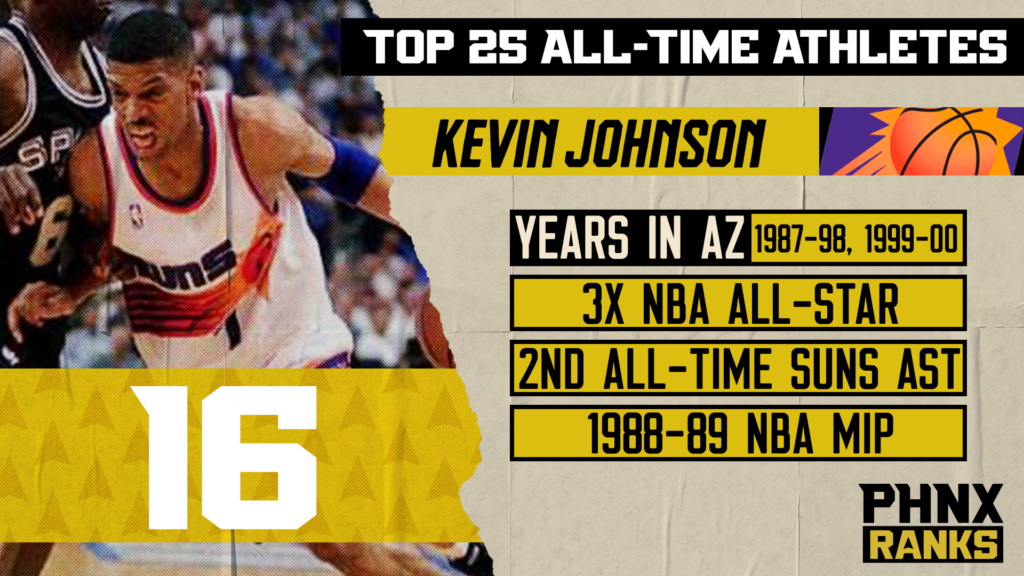
Cracking the list of all-time greatest Suns is the hardest list to crack in Valley sports. KJ earned his spot with a consistently excellent career that was sometimes marred by injuries. In 12 seasons with the Suns, he averaged 18.7 points per game, 9.5 assists and 1.5 steals. Johnson quickly made fans forget about the trade of Suns legend Larry Nance that brought KJ to the desert. The 1988–89 season was the first of three straight seasons in which Johnson averaged at least 20 points and 10 assists, joining Oscar Robertson and Isiah Thomas as the only players in league history to accomplish that feat at the time. In KJ’s first seven full seasons in Phoenix from 1989 to 1995, the Suns won the most regular season games in the NBA (394). The three-time NBA All-Star led the Suns to three conference finals and one NBA Finals where the 1992-93 Suns fell in six games to the Michael Jordan-led Bulls.
No. 15: Curly Culp – Arizona State Sun Devils

Culp is a shining example of what was possible when college athletes were afforded the time to compete in more than one sport. A Yuma native, Culp enrolled at ASU to compete in football and wrestling. He excelled in both. He played both offensive and defensive line for legendary coach Frank Kush, but he stood out at nose guard, where the 1967 team held opponents to an average of 79.8 yards per game. On the mat, Culp recorded a 84-11-1 record, three WAC championships, and he was the 1967 NCAA heavyweight champion, winning the Gorriaran Award for scoring the most pins at the NCAA Division I Wrestling Championships.
No. 14: Sean Elliott- Arizona Wildcats
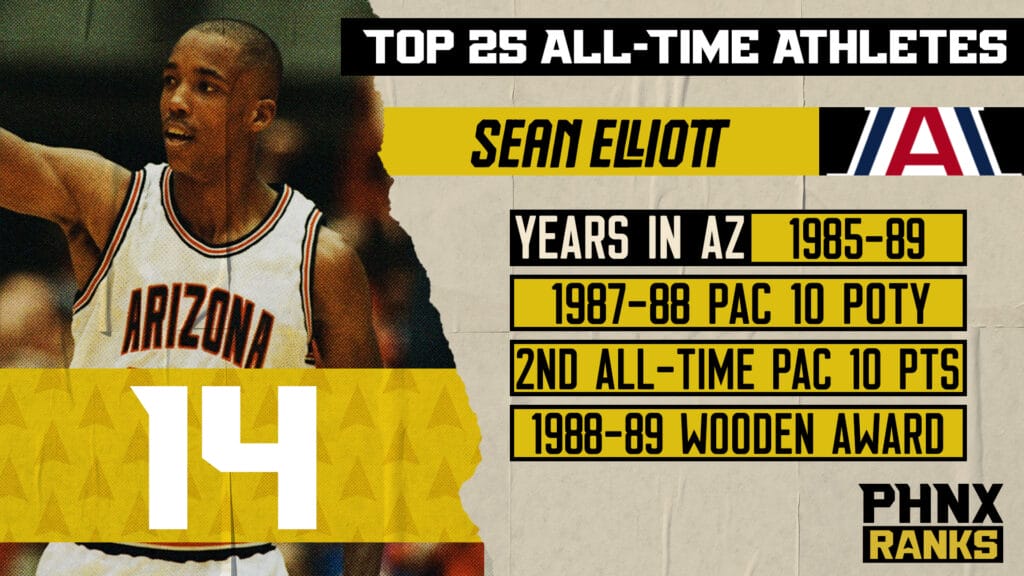
Among the University of Arizona’s star-studded cast of former players, none deserves marquee billing above Tucson native Sean Elliott. He helped lead the US national team to the 1986 FIBA World Championship gold medal after his freshman season. He led the Wildcats to their first Final Four appearance in 1988 as a junior. He was a two-time first-team All-American, a two-time Pac-10 Player of the Year, and in his senior season, he won the AP Player of the Year and the John R. Wooden Award as the most outstanding player in college basketball. He is still the program’s all-time leading scorer with 2,555 career points — a mark that broke Kareem Abdul-Jabbar’s conference record.
No. 13: Aeneas Williams – Arizona Cardinals
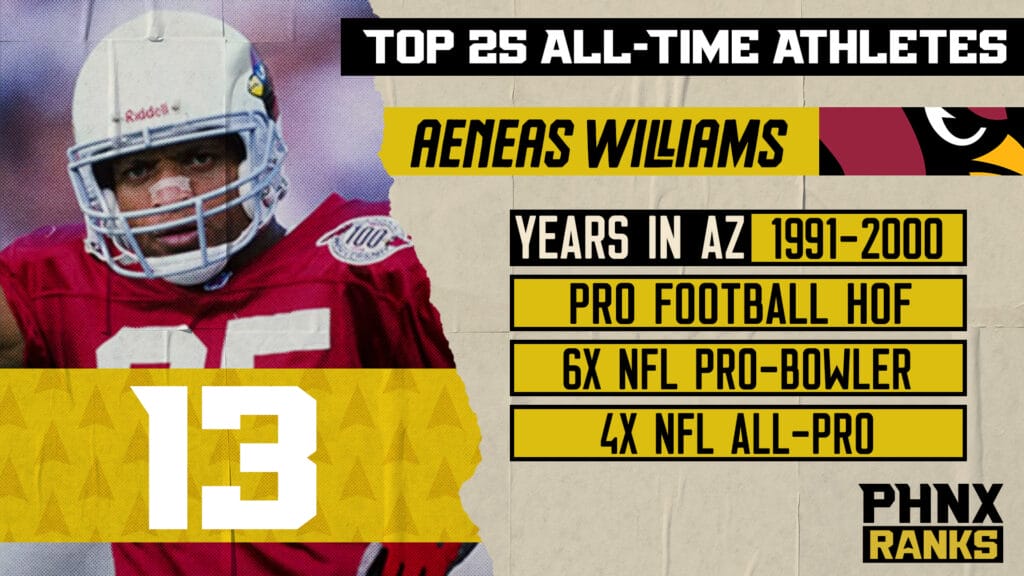
Aeneas Williams’ considerable achievements were often overshadowed by the fact that he played for bad teams. In Williams’ 10 seasons in Arizona, the Cardinals had just one winning record and made the playoffs just once; in 1998 when they beat the Cowboys in a wild card game before falling in the divisional round. Despite those challenges, Williams made eight Pro Bowls, he snared 46 interceptions (an NFL high 9 in 1994). In 2008, he became the 13th Cardinal inducted into the team’s Ring of Honor and is likely the best cornerback in franchise history.
No. 12: Jake Plummer – ASU/Arizona Cardinals
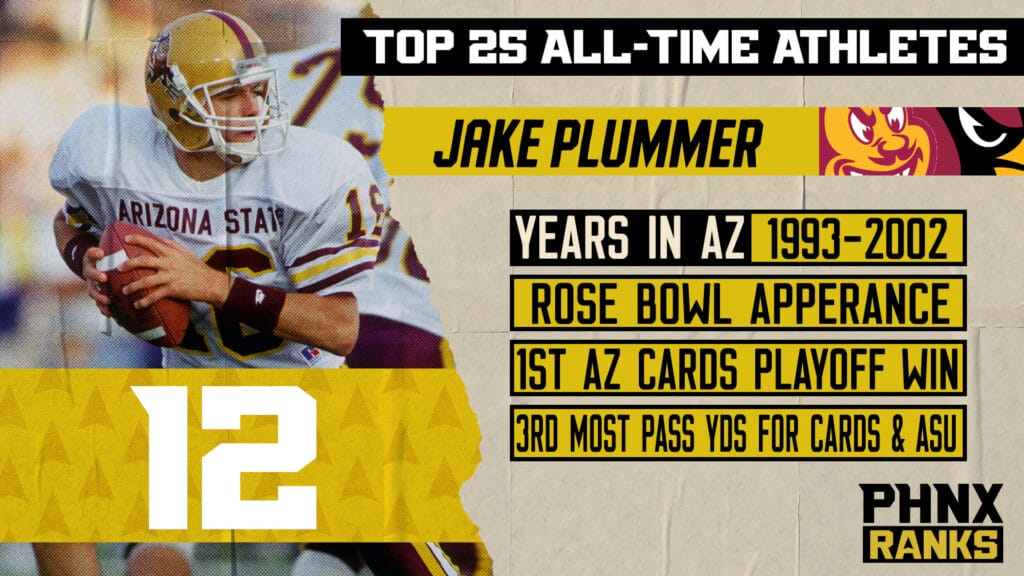
ASU will probably never come closer to a football national championship than Jake Plummer brought them in the storybook 1996 season. ASU attracted national attention on Sept. 21 when it shut out top-ranked Nebraska 19–0 to snap the Huskers’ 26-game winning streak. That game set the tone for an undefeated regular season and a Pac-10 championship. In the Rose Bowl, Plummer scored on a spectacular 11-yard go-ahead touchdown with just over a minute remaining, but Ohio State responded with a game-winning TD drive — aided by two pass interference penalties against ASU— for a 20–17 victory with 19 seconds remaining that robbed the Sun Devils of a national title. Plummer finished third in the Heisman Trophy voting that season, but his impact on the Valley was not over. Two years later, he led the Cardinals to a 20-7 wild card win over the Cowboys, giving the Cards their first playoff win in their 11 seasons in the Valley.
No. 11: Luis Gonzalez – Arizona Diamondbacks
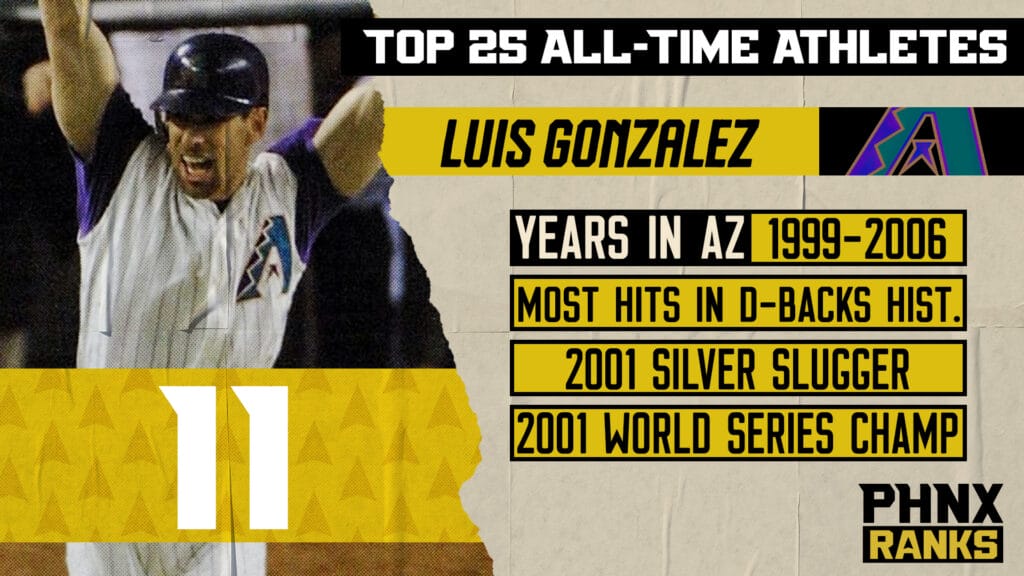
Brought over in a trade with Detroit for Karim García, Gonzo’s list of Arizona achievements is long. He was a five-time All-Star and won a Silver Slugger Award in 2001. His 596 career doubles currently rank 19th on the all-time MLB list. His 57 homers and 142 RBI in 2001 helped him finish third in an epic MVP race behind San Francisco’s Barry Bonds and Chicago’s Sammy Sosa. The moment etched in everyone’s memory, however, was the World Series clinching moment in which Gonzalez played the starring role. After Yankees second baseman Alfonso Soriano hit a home run off Curt Schilling in the eighth inning of Game 7 to give the Yankees a 2-1 lead, everyone figured the game was over. Stalwart closer Mariano Rivera was on to secure the save after striking out the side in the eighth. Mark Grace led off the inning with a single up the middle and was replaced by pinch runner David Dellucci. A Damian Miller bunt put runners at first and second. Jay Bell couldn’t advance the runners, grounding into a force play at third, but Tony Womack drove in the tying run with a single that pushed Bell to third base. Craig Counsell was hit by a pitch, bringing Gonzalez to the plate with the bases loaded. His floater over a drawn-in infield gave the Valley its only major men’s pro title.
No. 10: Kurt Warner – Arizona Cardinals

Kurt Warner’s Arizona impact ended just as it felt like it was beginning. After leading the Cardinals on a Cinderella run to Super Bowl XLIII — a game which they came within 35 seconds of winning — he followed it up with a spectacular 2009 season in leading the Cardinals to the NFC West title. His performance in a 51-45 Wild Card win against the Packers at University of Phoenix Stadium is one of the greatest individual performances in Arizona sports history. Warner completed 29 of 33 passes for 379 yards and five TDs, giving him more touchdowns than incompletions. One week later, the Saints battered Warner in a 45-14 Divisional Round win. It was the final game of his career. Citing the difficulties of the game and myriad other responsibilities in his life, Warner retired.
No. 9: Shane Doan – Arizona Coyotes
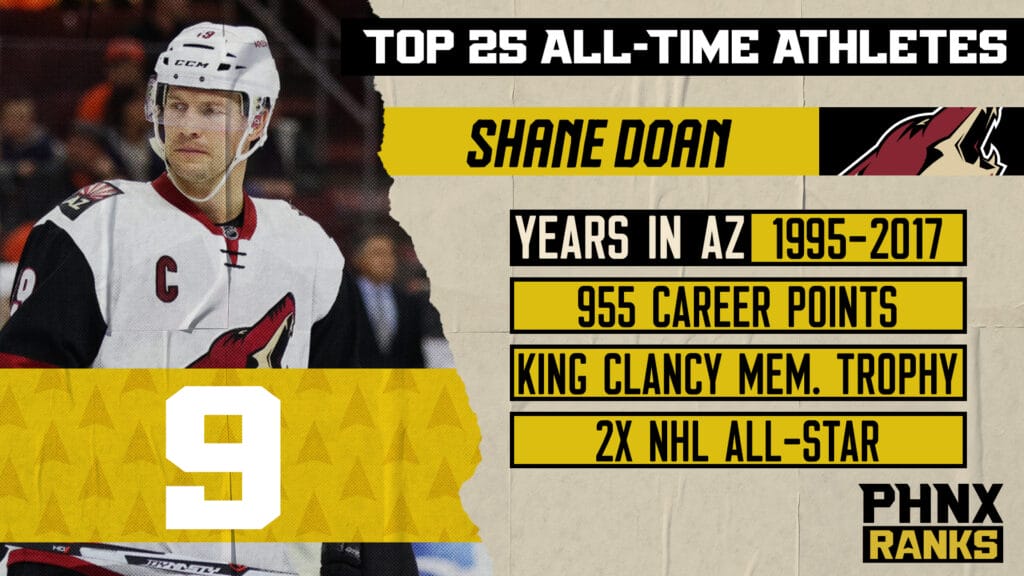
Like Pat Tillman, Shane Doan is the rare case where the intangibles make the player greater than the sum of his athletic achievements. He is not the greatest player ever to lace up skates for the Coyotes, although he is the all-time leader in games played (1,540), goals (402), assists (570), points (972), power-play goals (128) and game-winning goals (69). He is, however, the greatest captain of them all — a player whose relentless drive helped galvanize a less talented group of players into the greatest run in franchise history. An ambassador who helped end an NHL lockout and save the franchise from relocation on multiple occasions. A good soul whose humanity, generosity and genuine engagement with everyone he met helped him transcend a lesser-appreciated sport and somehow become a Valley icon.
No. 8: Pat Tillman – ASU/Arizona Cardinals
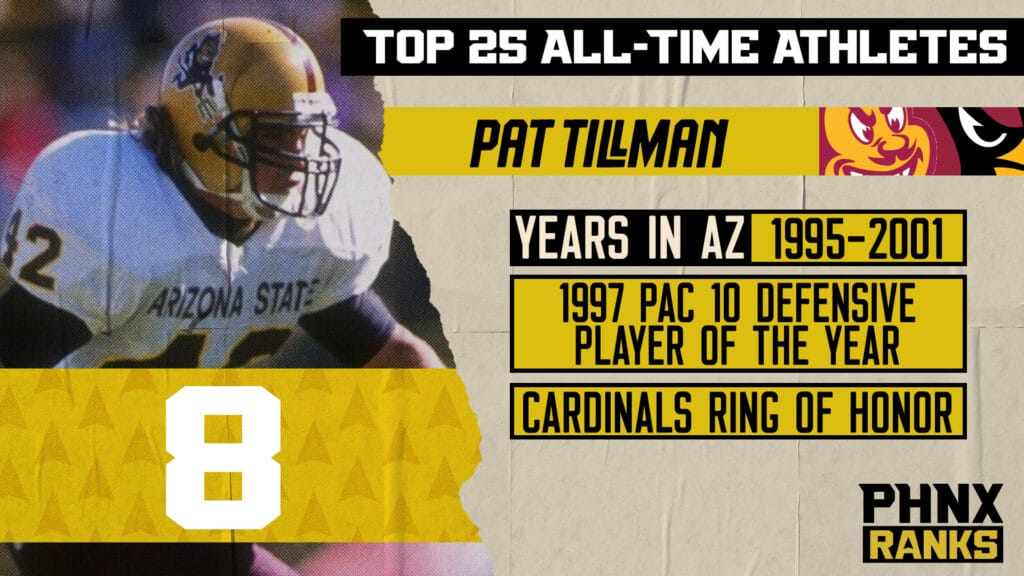
Pat Tillman’s impact on the Valley cannot be measured by his performance on the football field. Tillman was a superb linebacker at Arizona State; one who helped lead the Sun Devils to within seconds of a national championship in 1996, and one who was named Pac-12 Defensive Player of the Year in 1997. While he was just an average NFL player, he set an impeccable example of sacrifice for his country when he left the riches of the NFL to enlist in the United States Army in May 2002 in the aftermath of the Sept. 11 attacks; a decision that ultimately cost him his life. If you’re making a Mt. Rushmore of Arizona athletic personalities, Tillman is the first face engraved.
No. 7: Devin Booker – Phoenix Suns
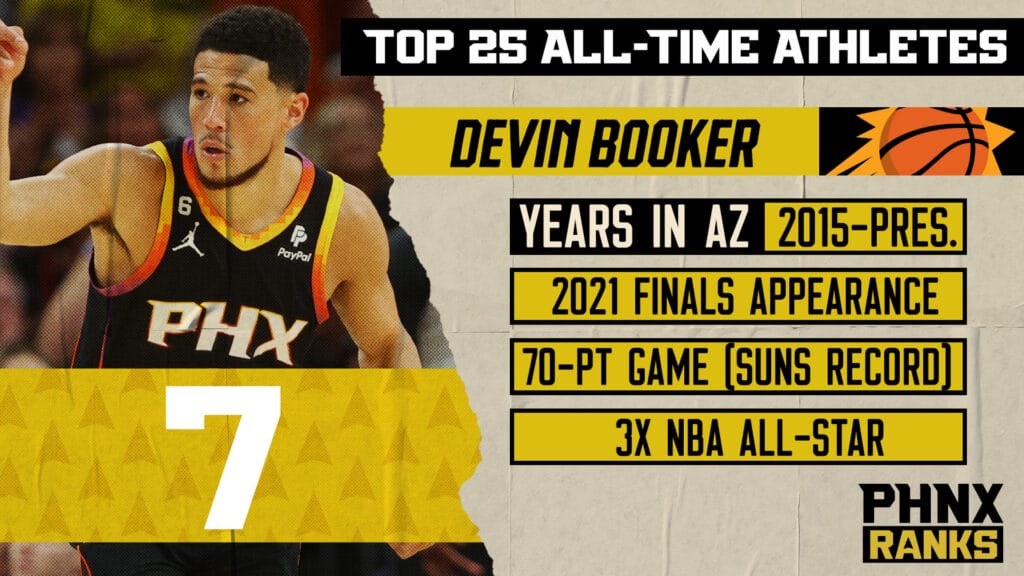
When Commissioner Adam Silver stepped to the podium and said “with the 13th pick in the 2015 NBA Draft, the Phoenix Suns select guard Devin Booker from the University of Kentucky” no one ever imagined what the young man would become. In fact, at best, most analysts thought the Suns got a lesser version of Klay Thompson. Instead, what they wound up with was a fiercely loyal player who is as competitive as anyone who has ever put on the purple and orange. In his first seven seasons in the Association, he has set the Suns single game scoring record, taken the team to its third NBA Finals appearance in over five decades and is already fourth all-time in points for the franchise. He’s No. 7 now but he could very easily make a case for the top spot before it’s all said and done.
No. 6: Phil Mickelson – Arizona State Sun Devils

Mickelson’s inclusion on this list is a no-brainer. After opting to attend ASU, Lefty became the face of amateur golf in the United States. He captured three NCAA individual championships and three Haskins Awards (1990, 1991, 1992) as the outstanding collegiate golfer. He also led the Sun Devils to the team title in 1990 and a runner-up finish in 1992. While his pro exploits were not directly tied to Arizona, they only enhanced his profile. To date, Mickelson ranks second on the PGA Tour’s all-time money list and his 45 PGA Tour wins ranks tied for eighth all-time. He has also captured six major titles, including three Masters.
No. 5: Steve Nash – Phoenix Suns
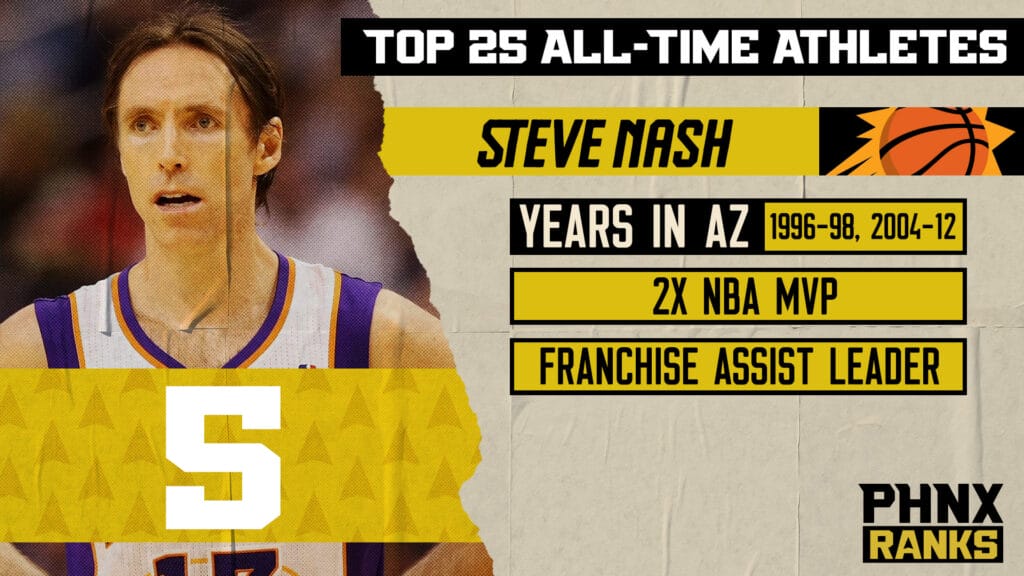
Steve Nash was never a prolific scorer and his defensive play was the subject of critique, but Nash averaged 10.9 assists during his eight seasons in the Valley and he led the league five times in that department. Under coach Mike D’Antoni, he was the perfect point guard to orchestrate the 7-seconds-or-less Suns; entertainment at its highest level. Nash was named league MVP twice (2005, 2006), an All-Star six times, and he led the Suns to the Western Conference Finals three times; the last (2010) being the most unlikely given the roster. A Ron Artest buzzer-beating putback at Staples Center prevented the Suns from forcing a Game 7 back at US Airways Center. Nash is the Suns all-time leader in career assists (6,997) and free-throw percentage (.907).
No. 4: Charles Barkley – Phoenix Suns
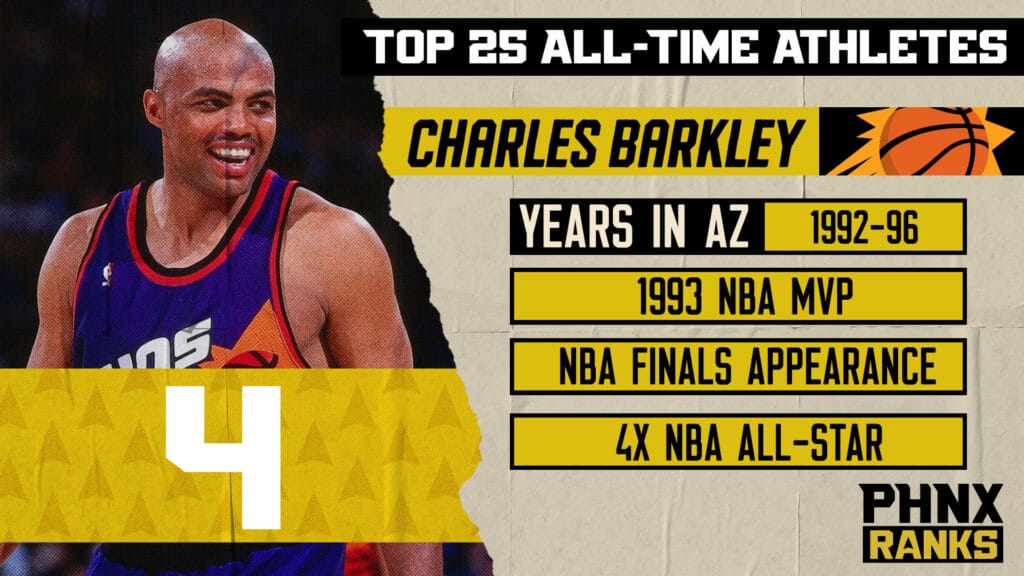
Like Fitzgerald, Barkley’s impact on the Valley could have been greater had he been able to lead the Suns to that elusive title. Some analysts believe that some of that failure can be attributed to Barkley’s less than all-in approach in the seasons after his MVP year of 1993, when only Michael Jordan and John Paxson’s clutch shooting kept him from a championship. Even so, no player has garnered greater media attention for the Valley than Barkley did in his four seasons here. He was a quote machine, he was well suited for the cameras and the spotlight, and he brought a swagger and personality to the Valley that had not been seen before and has not been seen since. He also brought an elite game. In his Phoenix tenure he averaged 37.3 minutes per game, 23.4 points, 11.5 rebounds, 4.4 assists and 1.6 steals. He was an NBA All-Star every year.
No. 3: Diana Taurasi – Phoenix Mercury
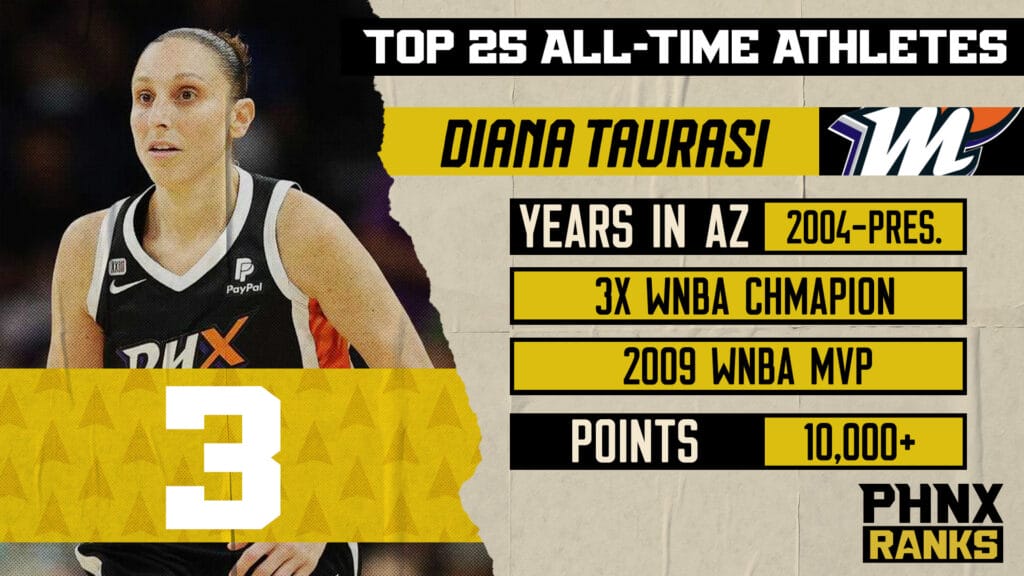
To several members of our panel, Taurasi is the unquestioned AZ GOAT.
She is the only player to lead a major Valley pro team to multiple titles (2007, 2009, 2014), she is a two-time WNBA Finals MVP (2009, 2014), she was named Rookie of the Year in 2004 and MVP in 2009. She was named an All-Star 10 times, and she led the league in scoring five times (2006, 2008–2011). She is the WNBA’s all-time leading scorer and the only player to eclipse 10,000 career points (10,108). She has also captured five Olympic gold medals (2004, 2008, 2012, 2016, 2020). It is hard to dispute that Taurasi is the greatest women’s player of all-time.
No. 2: Larry Fitzgerald – Arizona Cardinals
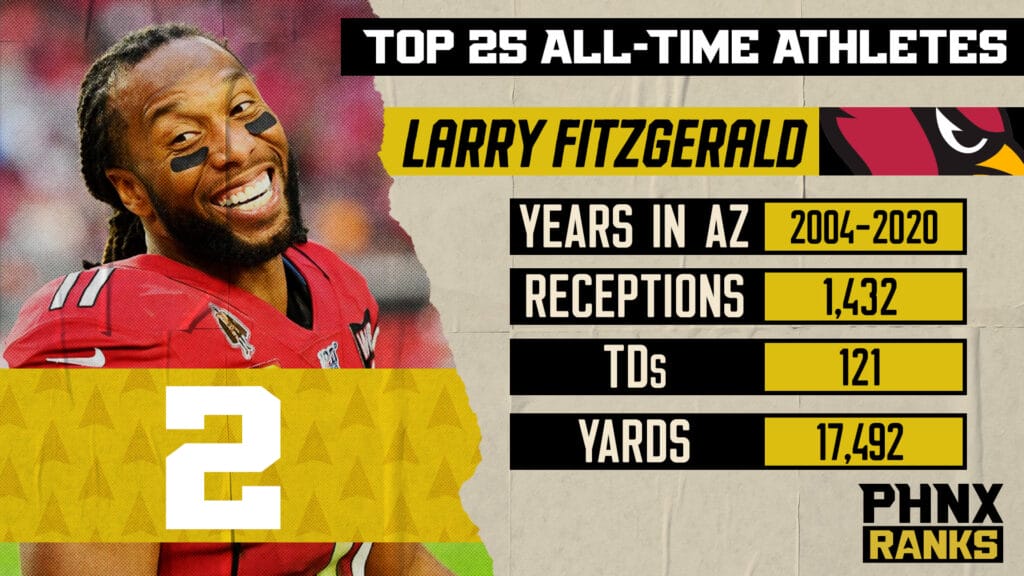
There are too many iconic moments in Larry Fitgerald’s career to mention them all, but the one etched in all of our memories is the go-ahead touchdown catch against the Steelers with 2:37 remaining in Super Bowl XLIII — the one that Fitzgerald himself watched on the Jumbotron as he sprinted toward the end zone. Had that game not ended on Santonio Holmes’ controversial 6-yard game-winning touchdown catch with 35 seconds left, Fitz might sit atop this list. As it stands, he still makes a great case. Channeling his indomitable will to win, his physical strength, his absurd athleticism, his vice-like hands and his mind-boggling hand-eye coordination, Fitzgerald was an 11-time Pro Bowl selection who retired in second place in NFL career receiving yards (17,492), second in career receptions (1,432), and sixth in receiving touchdowns (121). He is the face of this franchise and a Valley icon.
No. 1: Randy Johnson – Arizona Diamondbacks
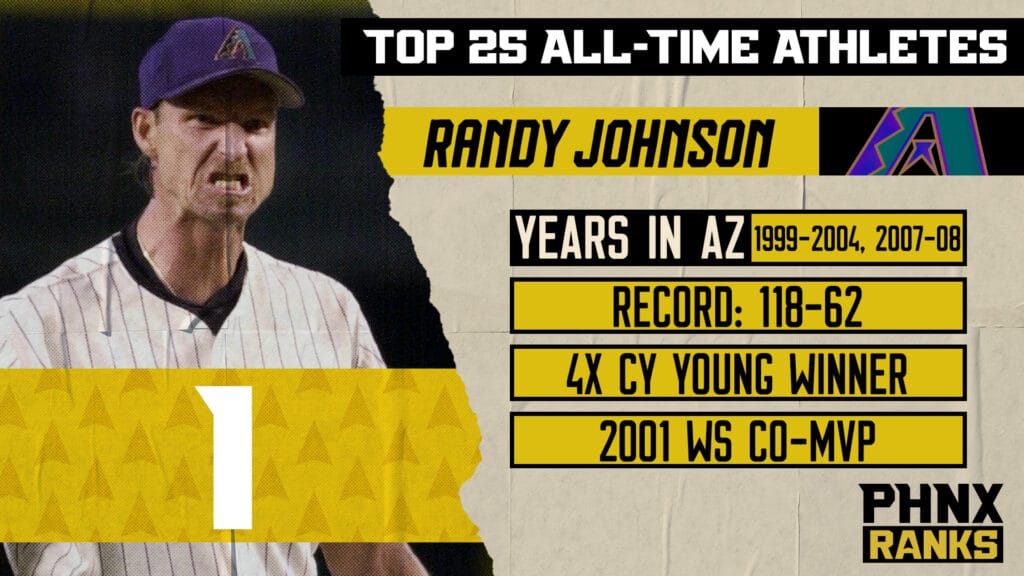
Until another player leads an Arizona men’s pro team to a title with as dominant a performance as Randy Johnson turned in, there is a strong case to list him at No. 1. In eight seasons in Arizona, The Big Unit won the NL Cy Young Award four times (1999-2002) and led the league in strikeouts five times. In 1,630.1 innings, he had a 2.73 ERA, 2,077 strikeouts, a 118-62 record, 38 complete games and 14 shutouts. On the biggest stage in the 2001 World Series, he went 3-0 with a 1.04 ERA and a shutout, earning Series co-MVP honors with Curt Schilling as the Diamondbacks beat the Yankees in the 2001 Fall Classic. Given the magnitude of his impact on a title-starved city, the stage on which he performed his act, and the massive interest that he drew to the team and to the game, Johnson is the panel’s choice as Arizona’s greatest athlete of all-time.
Have thoughts on the rankings? Share them in the comments.
Comments
Share your thoughts
Join the conversation

The Comment section is only for diehard members
Scroll to next article


